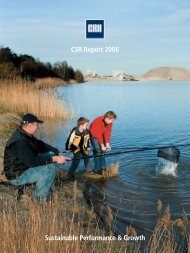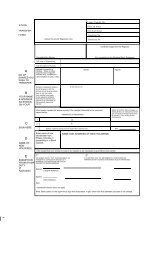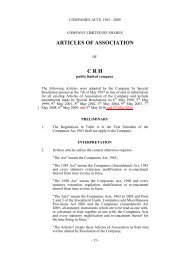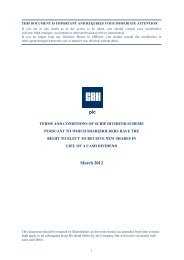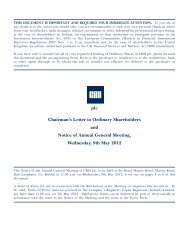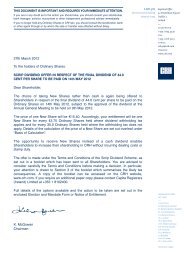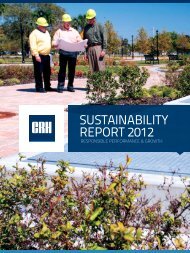2009 Annual Report - CRH
2009 Annual Report - CRH
2009 Annual Report - CRH
- TAGS
- annual
- www.crh.com
You also want an ePaper? Increase the reach of your titles
YUMPU automatically turns print PDFs into web optimized ePapers that Google loves.
<strong>Report</strong> on Directors’ Remuneration<br />
The Remuneration Committee<br />
The Remuneration Committee of the Board consists of non-executive Directors<br />
of the Company. The terms of reference for the Remuneration Committee are<br />
to determine the Group’s policy on executive remuneration and to consider and<br />
approve salaries and other terms of the remuneration packages for the executive<br />
Directors. The Committee receives advice from leading independent firms of<br />
compensation and benefit consultants when necessary and the Chief Executive<br />
attends meetings except when his own remuneration is being discussed.<br />
Membership of the Remuneration Committee is set out on page 41.<br />
Remuneration Policy<br />
<strong>CRH</strong> is an international group of companies, with activities in 35 countries. <strong>CRH</strong>’s<br />
policy on Directors’ remuneration is designed to attract and retain Directors of<br />
the highest calibre who can bring their experience and independent views to the<br />
policy, strategic decisions and governance of <strong>CRH</strong>.<br />
Executive Directors must be properly rewarded and motivated to perform in<br />
the best interest of the shareholders. The spread of the Group’s operations<br />
requires that the remuneration packages in place in each geographical area are<br />
appropriate and competitive for that area. In setting remuneration levels, the<br />
Remuneration Committee takes into consideration the remuneration practices of<br />
other international companies of similar size and scope and the EU Commission’s<br />
recommendations on remuneration in listed companies.<br />
The EU Commission’s recommendations were published in December 2004 in<br />
a document entitled “fostering an appropriate regime for the remuneration of the<br />
directors of listed companies” and those recommendations were supplemented<br />
by additional recommendations issued in <strong>2009</strong>. The Remuneration Committee<br />
supports the general objectives of the EU’s recommendations and the broad<br />
issues they aim to address. This is reflected in the detailed disclosures in this<br />
<strong>Report</strong> in relation to the Group’s remuneration policy, the elements of executive<br />
Directors’ remuneration (including bonus structure, deferred bonus arrangements<br />
and share incentive plans), the collective and individual remuneration of Directors<br />
and pension entitlements. The Company believes that shareholders are entitled<br />
to have a ‘say on pay’ and, accordingly, at the 2010 <strong>Annual</strong> General Meeting, this<br />
<strong>Report</strong> will be presented to shareholders for the purposes of an advisory vote. A<br />
number of the EU Commission’s recommendations, some of which are the subject<br />
of on-going consideration at government level and in investment associations,<br />
have not been implemented by the Remuneration Committee. Those areas will<br />
continue to receive the Committee’s active consideration and their relevance and<br />
practicality in the business context in which <strong>CRH</strong> operates will be assessed.<br />
Performance-related rewards, based on measured targets, are a key component<br />
of remuneration. <strong>CRH</strong>’s strategy of fostering entrepreneurship in its regional<br />
companies requires well-designed incentive plans that reward the creation of<br />
shareholder value through organic and acquisitive growth. The typical elements of<br />
the remuneration package for executive Directors are basic salary and benefits,<br />
a performance-related incentive plan, a contributory pension scheme and<br />
participation in the performance share and share option plans. It is policy to grant<br />
participation in these plans to key management to encourage identification with<br />
shareholders’ interests and to create a community of interest among different<br />
regions and nationalities.<br />
The Group also operates share participation plans and savings-related share<br />
option schemes for eligible employees in all regions where the regulations permit<br />
the operation of such plans. In total there are approximately 7,300 employees of<br />
all categories who are shareholders in the Group.<br />
Executive Directors’ Remuneration<br />
Basic salary and benefits<br />
The basic salaries of executive Directors are reviewed annually having regard to<br />
personal performance, company performance, step changes in responsibilities<br />
and competitive market practice in the area of operation. Employment-related<br />
benefits relate principally to relocation costs, the use of company cars and<br />
medical/life assurance. No fees are payable to executive Directors.<br />
Performance-related incentive plan<br />
The performance-related incentive plan is totally based on achieving clearly<br />
defined and stretch annual profit targets and strategic goals with an approximate<br />
weighting of 80% for profits and cash flow generation and 20% for personal<br />
and strategic goals. At target performance, payout is 80% of basic salary for<br />
Europe-based participants and 90% of basic salary for US-based participants. A<br />
maximum payout of 1.5 times these levels is payable for a level of performance<br />
well in excess of target.<br />
The four components of the plan are:<br />
(i) Individual performance<br />
(ii) Earnings per share growth targets<br />
(iii) Cash flow generation targets<br />
(iv) Return on net assets targets.<br />
Up to one-third of the bonus in each year is payable in <strong>CRH</strong> shares and the<br />
entitlement to beneficial ownership of the shares is deferred for a period of three<br />
years, with the individual not becoming beneficially entitled to the shares in the<br />
event of departure from the Group in certain circumstances during that time<br />
period.<br />
In addition, the Chief Executive, Mr. M. Lee, has a special long-term incentive plan<br />
incorporating targets set for the five-year period <strong>2009</strong>-2013. The plan incorporates<br />
challenging goals in respect of Total Shareholder Return by comparison with a<br />
peer group, growth in earnings per share and the strategic development of the<br />
Group, with a total maximum earnings potential of 40% of aggregate basic salary.<br />
While accruals are made on an annual basis, there is no commitment to any<br />
payment until the end of the period. Details of the manner in which the earnings<br />
are provided for under the plan are set out in note 2 to the table of Directors’<br />
remuneration on page 53.<br />
Performance Share Plan/Share Option Scheme<br />
Long-term incentive plans involving conditional awards of shares are now a<br />
common part of executive remuneration packages, motivating high performance<br />
and aligning the interests of executives and shareholders. The Performance Share<br />
Plan (PSP) approved by shareholders in May 2006 is tied to Total Shareholder<br />
Return (TSR). Half of the award is assessed against TSR for a group of global<br />
building materials companies and the other half against TSR for the constituents<br />
of the Eurofirst 300 Index.<br />
The maximum award under the PSP is 150% of basic salary per annum in the<br />
form of conditional shares and the vesting period is three years. The awards lapse<br />
if over the three-year period <strong>CRH</strong>’s TSR is below the median of the peer group/<br />
index; 30% of the award vests if <strong>CRH</strong>’s performance is equal to the median while<br />
100% vests if <strong>CRH</strong>’s performance is equal to or greater than the 75th percentile;<br />
for TSR performance between the 50th and the 75th percentiles, between 30%<br />
and 100% of the award vests on a straight-line basis.<br />
When approved by shareholders in 2006, the Performance Share Plan incorporated<br />
an earnings per share (EPS) growth underpin of the Irish Consumer Price<br />
Index plus 5% per annum, a requirement of the Irish Association of Investment<br />
Managers (IAIM) at the time. During <strong>2009</strong>, the IAIM advised that it did not regard<br />
this financial test as an additional hurdle but rather as a mechanism to assist<br />
the Remuneration Committee in determining whether TSR reflected performance.<br />
Following discussion with the IAIM, the rules of the PSP were amended to delete<br />
the underpin requirement, substituting in its place the condition that no award,<br />
or portion of an award, which had satisfied the TSR performance criteria would<br />
be released unless the Remuneration Committee had confirmed that the TSR<br />
outcome was valid and had not been significantly affected by unusual events or<br />
extraneous factors. In addition, the Committee reviews EPS growth to assess<br />
its consistency with the objectives of the performance assessment, for example,<br />
comparing EPS performance with that of non-financial companies listed on the<br />
Irish Stock Exchange.<br />
<strong>CRH</strong> 51





